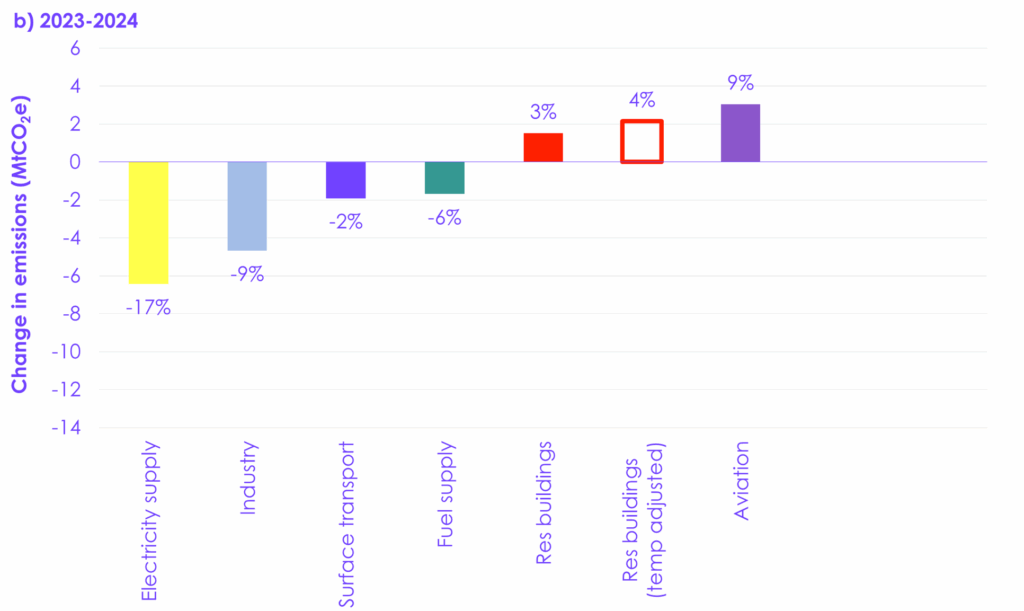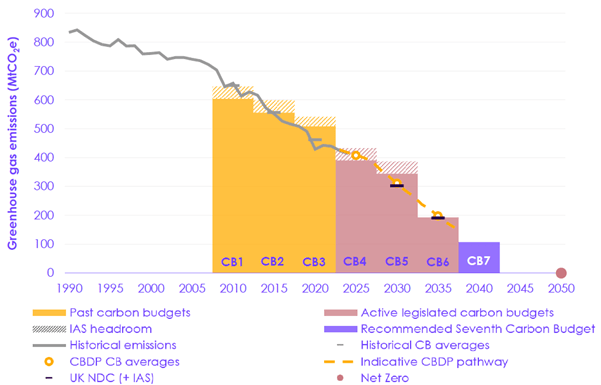
UK climate policy deep dive: CCC’s report on emissions reduction progress - July 2025
Introduction: The NED perspective
by Jock Lennox, Chapter Zero Fellow; Chair, Clarion Housing Group; NED and Chair of Audit Committee, Barratt Developments plc.
As others, I try to stay informed with the climate change debate so that I can remain engaged with the sustainability and transition planning that takes place at the corporate level. In that context, I note the recent Climate Change Committee report to Parliament that is the subject of this briefing.
The report provides an informed assessment of the UK’s progress to net zero and as it covers the entire landscape, there is something for everyone! As with all such reports and assessments the challenge is to find the connection that can help with action planning for you and your board.
I was quite taken with the reference in the report to the Seventh Carbon Budget citizens’ panel. The panel felt that “the Net Zero transition could be made accessible and affordable to all households, provided that policies and business action make household low-carbon choices easy, attractive and affordable, and trusted information is provided.”
I think this is pointing to the need for effective communication that connects with individual consumers and citizens such that they see and understand that their actions and choices are integrally important to the collective transition plan. At the corporate level, we have to think about our part in this, but this also needs to come at the sector and national government level.
As you will see in the report much has been achieved, but importantly much is to be done, especially if this connection with all households is to be achieved.
Key takeaways for boards
- The UK’s 2050 net zero target remains “deliverable and affordable”, but there are critical delivery gaps that must be addressed, according to new Climate Change Committee (CCC) analysis. 2024 marked the tenth consecutive year of emissions reductions (not counting the pandemic years), with emissions falling by 2.5% since 2023. Progress was primarily driven by decarbonisation of the UK’s electricity system, led by significant increases in renewable energy generation, the phaseout of coal power, and improvements in grid infrastructure. In zooming in on more immediate 2030 targets set out in the UK’s NDC, the CCC maintains that achieving a 68% reduction in emissions will require faster adoption of low-carbon electricity to replace oil and gas in surface transport, heat in buildings, and industry—alongside nature-based solutions such as tree planting, peatland restoration, and engineered removals. Boards can now review their businesses’ strategic thinking to ensure it is in line with this cross-sectoral focus and positioned to capitalise on emerging opportunities in electrification and clean technologies. Developments around the updated Carbon Budget and Growth Delivery Plan, due to be published in October 2025, are expected to spell out policy measures for industry and sectoral pathways in more detail, which will provide further useful framing.
- Government signals of progress are helping to create an enabling environment for scaling up investment in low-emission technologies. Ratcheting up investment levels is key to helping build confidence levels in emissions abatement as an economic imperative. The CCC’s assessment demonstrates that the UK is the first major economy to halve its emissions since 1990, a powerful signal of international climate leadership. This represents a real opportunity for businesses to leverage the UK’s supportive policy landscape, and act as leaders themselves in shaping large-scale industry transformation. Government reforms, including changes to the planning system, are aimed at enabling faster deployment of low-carbon technologies and opening up new avenues for businesses to unlock value. The CCC asserts that with more renewable technologies connecting to the grid, energy costs are becoming more predictable and affordable, offering long-term benefits for businesses’ financial planning and operational resilience. Boards can leverage these the interrelated priorities of emissions reductions and energy cost savings as strong justification for pursuing investments that deliver both environmental impact and long-term cost efficiency.
- Business buy-in is essential to closing policy delivery gaps. The CCC’s assessment finds that 61% of the required reductions in emissions to meet the 2030 NDC target are covered by credible plans, but the remaining 39% lack sufficient plans and present significant risks. Two of the biggest risks identified are the rollout of heat pump technologies and support for industrial electrification. This lack of defined plans for critical net zero technologies is undermining investor confidence and slowing the pace of delivery, at a time where focus must be on rapid supply chain growth. The CCC upholds that “effective delivery is likely to require both government and market action,” highlighting the opportunity for businesses to advocate for greater public-private sector policy alignment to accelerate the necessary shifts in technology and consumer choices. Emphasis on creating an enduring partnership with business is echoed in the June 2025 Modern Industrial Strategy, which commits the Government to implementing its 10-year plan to increase long-term investment and grow the UK’s industries of the future in partnership with business.
- The CCC recognises the UK’s green skills deficit as a significant barrier to accelerated progress, calling for greater focus on upskilling for climate mitigation. The CCC recommends that the Government carry out a comprehensive assessment of skills gaps specific to net zero, to pinpoint where policy intervention is most urgently needed. Addressing these gaps will require active engagement across the business community. Boards can play a proactive role in identifying and communicating skills needs, to better enable a responsive and effective strategy. As a starting point, greater clarity on how the Government intends to support green skills growth is expected in the forthcoming Net Zero Skills Plan, which is expected “in due course.”
Board summary
On 25 June 2025, the UK’s climate advisory group, the Climate Change Committee (CCC) published its annual report to Parliament, Progress in reducing emissions, in accordance with its mandate under the Climate Change Act 2008. The report finds that the UK’s territorial emissions – inclusive of international aviation and shipping – fell by 2.5% in 2024, representing a 50.4% reduction from 1990 levels and the tenth consecutive year of continued reductions. The report assesses emissions levels across different areas of net zero progress including buildings, energy, agriculture and land use, transport, engineered removals, and industry, identifying that the UK’s reduction in emissions was primarily driven by decarbonising the electricity supply. For the period of 2023-2024, 41% of the total in-year reduction in emissions can be attributed to the electricity supply sector, which has been partially offset by emissions increases from aviation and residential buildings. Despite significant progress, the CCC finds that in order to achieve the ambitions set out in the Clean Power 2030 Action Plan, total operational capacity of renewables will need to more than double in pace, requiring a tripling in annual installation of offshore and onshore wind, and a four-fold increase in solar energy compared to the average rate since the start of this decade. Importantly, while a decarbonised energy system is the cornerstone of sustainable growth in the UK, the CCC recognises that over 80% of emissions savings up to 2030 – must come from sectors outside energy supply.
The CCC’s assessment outlines a range of key factors to delivering more rapid progress: continued uptake of EVs in line with the zero-emission vehicle (ZEV) mandate, higher numbers of heat pump installations supported by Government funding through the Warm Homes Plan and the removal of planning barriers, and heightened focus on aviation emissions abatement – particularly considering the Government’s plans for an expansion of a third runway at Heathrow – a move which could result in an extra 4.4 million tonnes of CO2 annually. According to this recent analysis, aviation now contributes a greater share of total UK emissions than the entire electricity supply sector.

Figure 1 Change in UK emissions (2023-2024) (Source: Climate Change Committee).
The CCC recognises areas where emissions reductions policy is underdeveloped that are particularly relevant to businesses, including the Government’s agreement to link the UK emissions trading scheme (ETS) with the EU ETS. The previous 2024 progress report identified 35 priority actions that the UK Government should take to remain aligned with its emissions targets. Encouragingly, this year’s assessment finds that good or moderate progress has been made on 20 of these priorities – although four actions have seen no progress at all, including the priority of making electricity cheaper. As a result, the CCC proposes ten priority actions for the year ahead:
- Make electricity cheaper
- Provide confidence and certainty to scale heat pump deployment in existing buildings
- Implement regulations to ensure that new homes are not connected to the gas grid
- Introduce a comprehensive programme to decarbonise public sector buildings
- Accelerate the electrification of industrial heat
- Effectively deliver rapid expansion of the low-carbon electricity system
- Put policies and incentives in place to ramp up tree planting and peatland restoration
- Develop policy to ensure that the aviation industry takes responsibility for its emissions reaching Net Zero by 2050
- Finalise business models for engineered removals
- Publish a strategy to support skills

Figure 2 CCC's assessment of the UK's historical emissions, the Government's existing pathway, and the UK's targets. (Source: Climate Change Committee).
Despite the challenges it faces, the CCC upholds that, with accelerated policy action, the UK can deliver both its legislated targets and its internationally-committed emission reduction targets. This progress review follows the CCC’s April 2025 report, Progress in adapting to climate change, which highlighted the UK’s inadequate progress on climate adaptation. Taken together, these reports provide an up-to-date picture of where progress stands and an opportunity to reflect on how climate mitigation and adaptation can be delivered in a more balanced, complementary way. With greater insight on critical ambition gaps, businesses can move forward with stronger authority on where they are best-placed to have impact – not only in reducing their own carbon footprint, but also in aligning more strategically with higher-ambition sectoral and national targets.
Board discussion areas
- How do we understand our emissions impact at the strategic level? How does alignment with the UK’s national emissions reductions targets fit into our case for investment and vision for long-term business security?
- Does our transition planning set out pathways and timelines for addressing emissions risks? Do we have the required access to capital and insurance to act on these risks? Are we exploring innovative methods for financing adaptive technologies, such as heat pumps, electric vehicles, engineered removals, and nature-based solutions?
- Are we currently utilising offsetting methods, e.g. Carbon Capture and Storage (CCS), to mitigate our carbon impact? Do we as a board have sufficient oversight over this? Is there an appropriate confidence level in the credibility of these offsetting mechanisms in terms of delivering real-world reductions in our emissions? What business models for engineered removals would we like to see the Government adopt? How do we take on board the proposed linking of UK ETS and EU ETS?
- What are our emissions-related reporting obligations? What information are we disclosing and how could we see this changing in the future? Do we have a framework in place to address changing compliance requirements?
- Is awareness of and buy-in to emissions reductions targets – both strategic and legislated – well-established across our organisation?
- Do we have the right skills and capacities across the organisation to deliver on commitments? Have we identified any skills gap, if so, are we engaging with the right stakeholders to address these? What policy outcomes would we like to see from Government’s forthcoming Net Zero Skills plan?
- As a board, have we unpacked the Government’s Modern Industrial Strategy? Do the objectives it sets out align with our strategy? Does it give us better insight into what forms of guidance and assistance from policymakers are needed to better enable us to deliver on emissions reductions?
- Are there opportunities for business leadership that we are well-placed to seize and/or create? How can we help push the business imperative for more effective Government action on the CCC’s priority actions?


